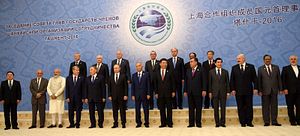Indian Prime Minister Narendra Modi is in Kazakhstan to attend a summit meeting of the Shanghai Cooperation Organization (SCO) where India, along with Pakistan, will assume full membership of the grouping. The two will be the seventh and eighth members of the SCO after China, Kazakhstan, Kyrgyzstan, Russia, Tajikistan, and Uzbekistan. India was admitted into the SCO as an observer at the 2005 Astana Summit along with Iran and Pakistan. Though the 2010 Tashkent Summit lifted the moratorium on new membership, India’s role in the grouping had remained a marginal one. And in last year’s summit, the SCO has also opened the doors for Iran’s entry as a full member which will also be considered this year.
The SCO region covers almost 60 percent of the Eurasian landmass, with over 1.5 billion people included in its population, including some of the world’s leading energy-rich nations. So its importance is likely to grow in the coming years. India’s growing stakes in Central Asia too are well-recognized. For India, therefore, a membership in the SCO is primarily its gateway to Central Asia. India is hoping to be able to access trade and transit routes between Russia and China, which pass through Central Asian countries. India would certainly like to a member of an organisation that is now becoming dominated by China’s growing clout if only to balance its Asian neighbor.
The importance of the SCO has evolved into a forum for discussion on regional security and economic issues has often been overstated. The SCO emerged as a significant factor in the post–9/11 environment as growing ethnic nationalism and Islamic fundamentalism emerged as major causes of concern for Russia, China and Central Asian states. The SCO has served for them as a means to keep control of Central Asia and limit American influence in the region. But beyond that it has not been able to accomplish much so far as a regional grouping.
In fact, it is the Russia-China dynamic that is shaping the trajectory of the SCO today with Russia focused on making the organisation as a challenger to the West and China more interested in making it a vehicle for the realization of its geoeconomic strategic aims. India might find itself isolated as a Russia-China-Pakistan alliance might be tempted to strike out common positions on regional issues. There are already some suggestions that the SCO can become a platform India-Pakistan rapprochement. That is something India will be wary of as India-Pakistan dialogue under the watchful eyes of Chinese is the last thing New Delhi needs. India’s concerns about terrorism emanating from Pakistan may not find wider resonance in a grouping where China will be all too ready to shield its ‘all-weather’ ally.
More significant is the growing Chinese dominance of Central Asia and, with the Belt and Road Initiative (BRI), this dominance is only likely to grow in the coming years. All members of the SCO are enthusiastic supporters of the SCO with India being the sole outlier. This will complicate India’s engagements as China would like to use the SCO to pursue its own interests by pushing through its per projects. India’s position on BRI remains uncompromising because of territorial sovereignty issues as the China-Pakistan Economic Corridor (CPEC) passing through the Pakistan-occupied Kashmir. While in the past India could have counted on Russian support to balance China, this assumption can no longer be taken for granted too.
As India becomes a part of the SCO, it will have to be cognizant of the underlying geopolitical realities that have shaped the evolution of the SCO and their impact on its foreign policy priorities. It may turn out that joining SCO may not be as beneficial to Indian interests as was thought when India applied to be a member a few years back. At a time when even the BRICS grouping is in danger of being made redundant due to Sino-Indian tensions, it is far too much to expect that the SCO will pay out any useful dividends for India.

































